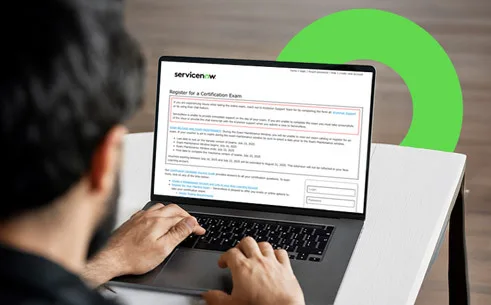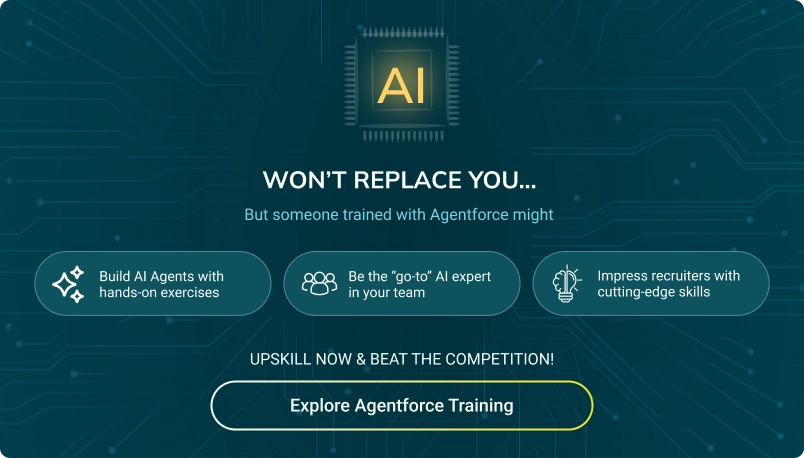Table of Contents
Surviving in the Salesforce Job market is similar to staying alive in an all-out war. Most of you will be both nervous and excited about the idea of getting a job in the world’s no.1 CRM right?
Are you facing the tough challenge of how to make a strong impression in the Job market? We have come to your aid. This blog will answer all your expectations on developing a solid Salesforce career pathway.
Our steps are simple and easy to follow thus providing both new candidates and experienced professionals with similar rewards.
We will walk you through the journey in detail so there is no confusion and the target is reached perfectly. So without further ado, let’s look into the foundation material for building Salesforce jobs.
Salesforce Job Market
Before delving into strategies, it’s essential to comprehend the dynamics of the Salesforce job market. With the continuous growth of Salesforce adoption across industries, the demand for skilled professionals has surged.
Companies are seeking individuals who not only possess technical expertise but also demonstrate adaptability, problem-solving skills, and a deep understanding of Salesforce’s capabilities.
To answer the needs of employers we will take you through simple steps of getting Salesforce entry-level jobs below:
1. Mastering Core Salesforce Skills
To stand out, start by mastering the core Salesforce skills. Develop a solid understanding of the Salesforce platform, including navigation, data modelling, and customization.
Proficiency in Apex, Visualforce, and Lightning components is often a prerequisite. Stay updated on the latest Salesforce releases and features to showcase your commitment to continuous learning.
2. Obtain Relevant Certifications
Certifications are the badges of professionalism and proficiency in the Salesforce world. Acquire certifications aligned with your career goals, such as Salesforce Administrator, Platform App Builder, or Developer certifications.
These not only validate your skills but also enhance your credibility in the eyes of employers. Be strategic in choosing certifications that align with the roles you aspire to.
It is important to recognize your inclinations before choosing a role so be careful about this step. Be open to having discussions with industry experts and online platforms for the same.
Read More:
Ultimate Guide for All Salesforce Certifications
3. Build a Strong Online Presence
Establishing a robust online presence is crucial in today’s digital age. You need to create a well-crafted LinkedIn profile that highlights your Salesforce expertise, certifications, and accomplishments.
Engage in Salesforce communities, forums, and social media platforms to connect with professionals, share insights, and stay informed about industry trends. With this step, you have started the process of building your presence in the job market. Keep up the good work.
4. Showcase Real-world Projects
Employers value practical experience. Showcase your skills by working on real-world Salesforce projects, whether for your current employer, nonprofit organizations, or personal initiatives.
Highlight these projects in your portfolio, emphasizing the challenges faced, solutions implemented, and the impact on business outcomes. Employers will most likely judge your competence based on your depiction and performance in these projects. So, you need to be particular about these with a strong display of professionalism.
5. Networking and Mentorship
Networking is like building a powerful group for professional discussion in the Salesforce community’s future. Attend Salesforce events, webinars, and meetups to connect with professionals in the community.
Seek mentorship from experienced Salesforce practitioners who can provide guidance, share insights, and potentially open doors to new opportunities. It is also one of the most important steps as you are likely to get a job opportunity here. Next, let’s start working on the skills that will form the basis of your career profile.

6. Develop Soft Skills
While technical proficiency is crucial, employers also value soft skills. Develop your communication, problem-solving, and collaboration abilities. Effective communication is especially vital as Salesforce roles often involve interacting with diverse teams, including non-technical stakeholders.
Every role of Salesforce will require you to work with a group of people and solve problems for the organization. Thus, learn to communicate with people and get a good grasp of problem-solving to build effective solutions in your Salesforce job role.
7. Stay Informed About Industry Trends
The Salesforce ecosystem is dynamic, with constant updates and evolving best practices. Stay informed about industry trends, emerging technologies, and Salesforce advancements.
It is quite natural for employers to ask about updates and insights you hold personally in your applied role. Demonstrating knowledge of the latest trends showcases your commitment to staying at the forefront of the field. So, keep a lookout on the market to capture the best opportunities.
Read More:
Insider’s Guide to Getting a Job as a Salesforce Professional
8. Tailor Your Resume and Cover Letter
Employers tend to interview professionals with catchy resumes having strong highlights. Craft a compelling resume and cover letter tailored to the specific role you’re applying for.
Clearly outline your achievements, experiences, and how your skills align with the requirements of the job. It will also do you good to research the employer before crafting your cover letter. This will help in highlighting areas that are of importance to the hiring party.
Use quantifiable metrics to highlight the impact of your contributions in previous roles. You can mark this step also as the most important one as your resume highlights your professionalism as well.
Hurray! it’s time to celebrate as you have successfully made an impression on the majority of employers until now. Let’s do some finishing touches in the next two steps to make it sustainable.
9. Participate in Salesforce Communities
Engage actively in Salesforce communities, both online and offline. Contribute to discussions, share your knowledge, and learn from others. Being an active member of the Salesforce Ohana not only expands your network but also demonstrates your commitment to the community.
It is like any other marketplace; every seller needs to ensure a spot for themselves. Similarly, this step will help you sustain a spot in the market in future. So, be active about it as this will lead to your career growth.
10. Continuous Learning and Adaptability
The Salesforce landscape is continually evolving. Showcase your commitment to continuous learning and adaptability. Highlight any additional training, courses, or self-learning initiatives you’ve undertaken to stay current with Salesforce technologies.
As the saying goes friends, a good bird knows when it’s going to rain. So, if the need arises be prepared to invest more into learning new things. This mentality will lead to better growth and long-term existence in the Salesforce ecosystem.

Conclusion
In the competitive Salesforce job market, standing out requires a multifaceted approach. Mastering core Salesforce skills, obtaining relevant certifications, building a strong online presence, showcasing real-world projects, networking, developing soft skills, staying informed about industry trends, tailoring your application materials, participating in Salesforce communities, and emphasizing continuous learning are all integral components.
Remember that differentiation in the job market is not a one-time effort but an ongoing journey. Continuously refine your skills, stay connected with the community, and adapt to the evolving landscape.
By implementing these strategies, you’ll position yourself as a standout professional in the thriving world of Salesforce. Your journey to success in the job market is an exciting adventure, and each step you take brings you closer to new opportunities and career heights.
Join our newsletter: Get daily update on Salesforce career insights & news!
Join Now!

















